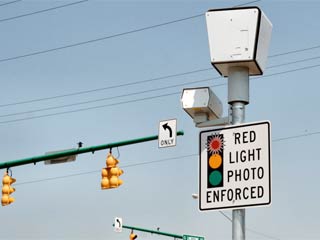1-2-3 Red Light
by Buck Quigley
Automating traffic control not as easy as it seems

Another level of surveillance may soon be on Buffalo streets if the current push to install red-light cameras continues to gain momentum. As it stands, New York City is the only place in the state where the cameras are legal, but the issue is being pushed by Mayor Byron Brown, and appears to have the support of seven members of the Common Council. Only South Council Member Michael Kearns and Niagara Council Member David Rivera are expressing concerns at this point.
Kearns asks if the cameras will be used responsibly and if they will actually wind up making money for the city, while Rivera wonders if, when someone besides the owner is driving the car when it runs a red light, who is then responsible for paying the ticket?
It’s a good question, one that is playing out in our fellow Rust Belt city of Cleveland, where a new court ruling is exposing some of the complexities of automating a task that used to be the job of police officers.
According to a February 20 report in the Plain Dealer, traffic cameras were put in place in late 2005, in an effort to increase safety and make money—the same argument we are hearing here now. There, the wording of the code violation says that the owner of the vehicle is “eligible for the penalty.” But last Thursday, Cleveland attorney Blake Dickson fought city hall and won.
It seems that Dickson’s law firm had been issued two $100 tickets issued to an Audi the firm leases. Rather than pay the tickets, Dickson went to court. In the end, he took his argument through three courts, and the 8th Ohio District Court of Appeals agreed that he had discovered a loophole in the law. As it is written, the law shields drivers of rented or leased cars. He estimated it cost $11,000 in legal fees to pursue the case on principal.
The judge’s decision may open the door for a whole world of complicated possibilities. Drivers who own their cars are thus victims of a double standard, and might contest their unfair convictions in court. Meanwhile, anyone who received a ticket from the cameras could sign on to a class-action lawsuit: 108,000 tickets were issued in the past year. In arguing the unfairness of the law, Dickson also pointed to the unpopular automated cameras as a reason thousands of people are discouraged from going downtown.
While the city council in Cleveland is now considering an amendment to the law, a March 24 meeting is scheduled in Buffalo’s city hall, where residents will have an opportunity to comment on our proposed red-light camera program.
—buck quigley
blog comments powered by Disqus|
Issue Navigation> Issue Index > v8n9 (week of Thursday, February 26, 2009) > The News, Briefly > 1-2-3 Red Light This Week's Issue • Artvoice Daily • Artvoice TV • Events Calendar • Classifieds |









 Current Issue
Current Issue